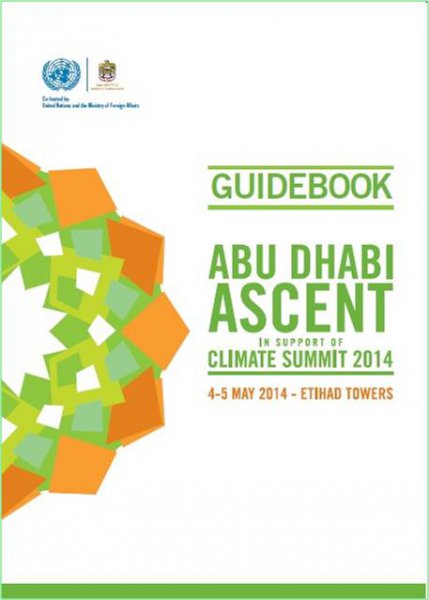Abu Dhabi Ascent, a special two-day high-level meeting, was held 4-5 May in Abu Dhabi, United Arab Emirates, in preparation of the United Nations Secretary General’s Climate Summit on 23 September 2014. The meeting brought together ministers as well as business, finance, and civil society leaders to determine how their countries, businesses and organizations can become more involved in the various initiatives and partnerships under development for the September Summit. Please see Ascent Agenda to learn more about full program and speaker list. Also please see UNDP Administrator Helen Clark’sclosing remarks for an overview of the discussions at Abu Dhabi.
Transport was covered in the High Level Presentations on Ascent Action Areas on Sunday May 4 with Wu Hongbo (Under Secretary-General, United Nations Department of Economic and Social Affairs), Gunjan Parik (Director, Transportation Initiative at C40 Cities Climate Leadership Group), and Peter Bakker(President, World Business Council for Sustainable Development). In addition there were 4 break out sessions in which Transport related iniatives are presented:
- Low Carbon Transport
- Energy Efficiency
- Urban Transport Solutions
- Accelerating Action on Short Lived Climate Pollutants
 In Abu Dhabi Ascent, representatives of private sector and the civil society organizations announced 31 initatives in 9 different high-impact areas. Transport was the second largest sector making 6 out of 31 initiatives in four areas; transportation, cities, energy and short-lived climate pollutants.
In Abu Dhabi Ascent, representatives of private sector and the civil society organizations announced 31 initatives in 9 different high-impact areas. Transport was the second largest sector making 6 out of 31 initiatives in four areas; transportation, cities, energy and short-lived climate pollutants.
Please see the Ascent Guidebook for full list of climate initiatives.
1. Transportation
3. Energy Efficiency
Global Fuel Economy Initiative: Public-private partnership to double vehicle efficiency
– Interview with Sheila Watson, Executive Secretary of the Global Fuel Economy Initiative (coming soon)
– For more information on the GFEI Initiative, please click here.
4. Short-Lived Climate Pollutants
Green Freight Global Plan of Action: Committed governments and companies aim to expend and harmonize green freight programs that will generate reductions in black carbon and CO2 emissions from multimodal goods movement
– For more information on the Green Freight Initiative, please click here.